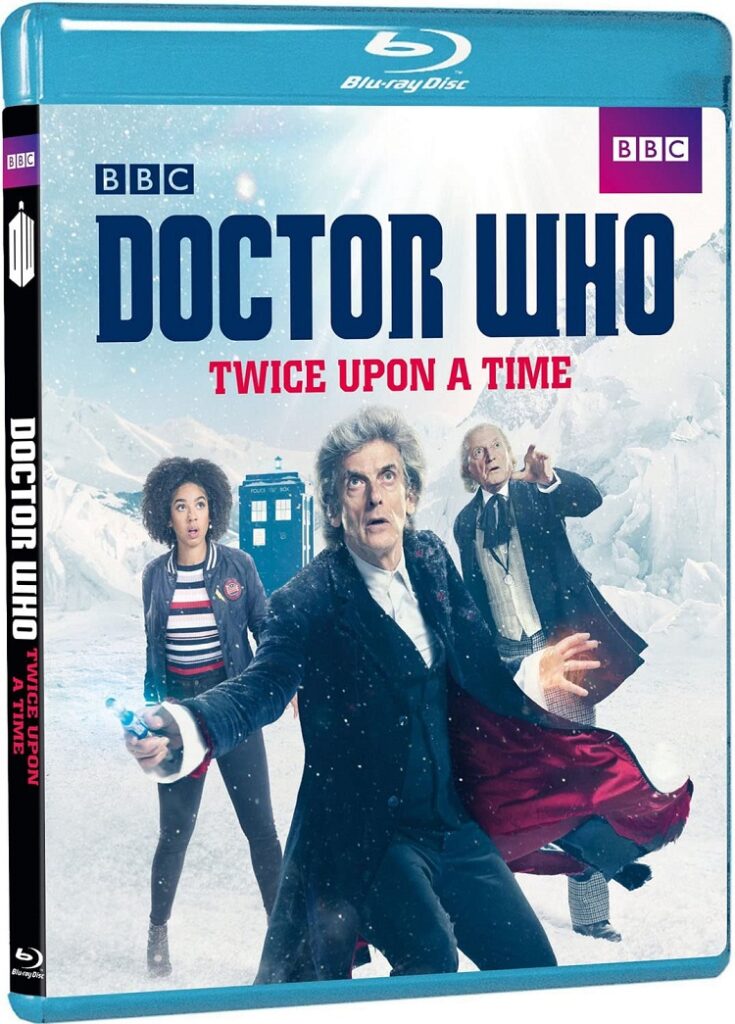
Having the Doctor regenerate when he “dies” was nothing short of a genius idea. In other television programs, replacing a main character with a different actor is a doomed idea, but in Doctor Who, it’s just another day at the office. Regeneration has allowed the series to run (almost) uninterrupted for over 50 years, periodically injecting new life blood into it as new actors take on the role.
That isn’t to say regeneration isn’t without its challenges or controversies. Whenever a new Doctor appears, there is much outcry from fans. When Jodie Whitaker (the first female Doctor ever) was announced, the reaction was fierce.
For me, it always takes an adjustment period to get used to a new Doctor’s personality. When David Tennant took over for Christopher Eccleston, I wondered who this new guy was with his hipster shoes and enormous grin. When Matt Smith came along, I frowned at his youth and floppy hair. But I learned to love both in time. It was the same with Classic Who. Like most Americans, I first learned of Doctor Who through Tom Baker and there is always a period of adjustment whenever watching someone else.
Strangely, I loved Peter Capaldi the moment he appeared on screen. He was, in fact, the first “new” Doctor I ever watched on his original air date. Though I’ve been a full-fledged Whovian for seven or eight years, I didn’t come to new episodes until the middle of Matt Smith’s run (which says something about how slow they are at releasing new seasons.) Watching Capaldi from the get go with everyone else was really fun. I loved how much older he was than all the previous New Doctors. I loved how different – how alien – he was. He was cranky, less interested in saving every single soul, less flirty, and more interesting than the Doctor had been in quite a while.
But now he must move on and a new Doctor will come. Out too is Steven Moffat, head writer, executive producer, and showrunner for the last eight years. With “Twice Upon a Time,” they both get a lovely send-off and pave the wave for all things new.
When we last saw The Doctor in “The Doctor Falls,” his body was ready to regenerate but his mind wasn’t quite there. The TARDIS flies him to Antartica where he meets the first incarnation of himself (David Bradley playing the role originated by William Hartnell). We learn that the First Doctor is also not quite ready to regenerate and their meeting quite literally stops time. Out from the frozen (in time) snow comes a World War I Captain (Mark Gatiss) who wonders if either of them is a doctor. Capaldi’s cheeky response sends us to the opening credits.
When we return, an alien spaceship beams up the three with the TARDIS. There they meet a crystal lady who (eventually) informs them that their race abducts people at the moment just before their death, copies all of their memories, and then sends them back to die with no one the wiser. They are creating an enormous database of testimonies for the greater knowledge of the universe. Neither Doctor seems to know what to do with an alien species whose plans are beneficial instead of nefarious and they go on their merry way and regenerate.
That is pretty much the entirety of the plot (well, I might have left out a few bits, but it really is pretty light on story). The Doctor meets an old enemy or two and a few more old friends. There is a rather moving scene set during the Christmas Truce of WWI, but yeah, not much really happens.
Ultimately, this is played out as a very warm send-off to Capaldi’s Doctor. The best parts are watching his interactions with Bradley’s version of the First Doctor. Their scenes together are wonderful and do a hilarious job of showing just how far the show (and all of us, culturally speaking) have changed since the 1960s.
The interactions with other old characters works less well, but gave me some warm fuzzies anyway. As noted, the story itself is pretty weak and the new aliens are kind of interesting but so underdeveloped we never get a true sense of them. As is the way during Moffat’s run, the actual regeneration is overblown and overlong. Capaldi gets a big speech at the end that is supposed to be moving, I suppose – perhaps the sort of thing one might put in your e-mail signature – but it comes out cloying and sentimental.
Still, there are plenty of very funny moments, and I admit I did tear up a time or two. Overall, a very sweet send-off for Capaldi. We only briefly see Jodie Whittaker as the new incarnation and she only gets a one-word line, but she totally sells it and I’m really excited to see where she goes with it.
This Fathom Event also gave us two, roughly 30-minute features. The first, shown before the episode was about Capaldi’s departure from the series and featured interviews and clips from his tenure. The second, shown after the episode, was about “Twice Upon a Time” and featured more interviews and behind-the-scenes clips. Both were quite enjoyable but covered some similar material (and indeed some of the same quotes) and I wished they aired them both after, as the first tossed in some mild spoilers for the episode and I’d worked very hard to come to it fresh.
I caught the very last theatrical airing of “Twice Upon a Time,” but Fathom Events continues to present a myriad of interesting events all of which you can read about on their website.
Special notice must be given to the Regal Cinema in Lexington, Ky. As I am on vacation, they are not my usual Fathom Events cinema, but they found me a seat even though they were completely sold out.